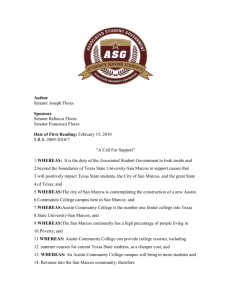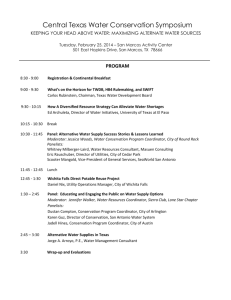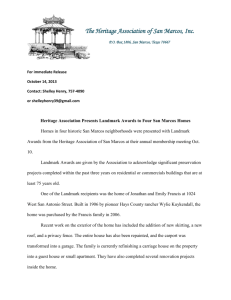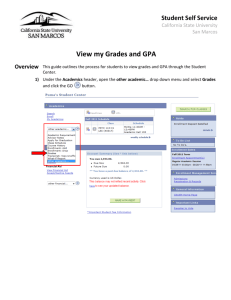Incentives - Greater San Marcos Partnership
advertisement
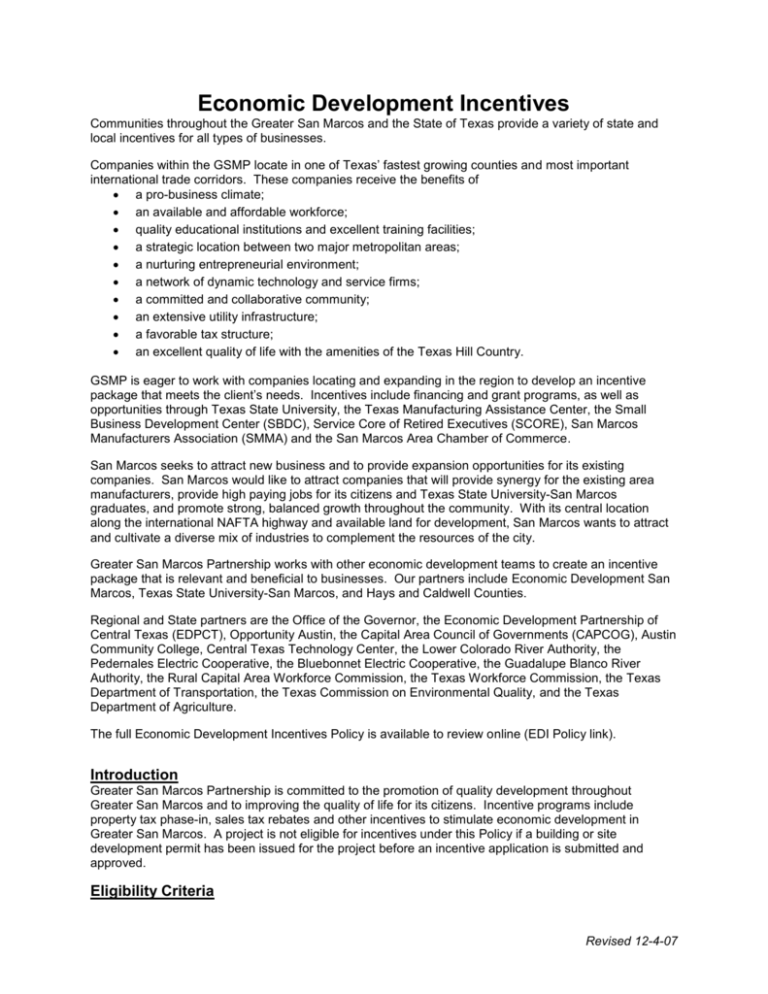
Economic Development Incentives Communities throughout the Greater San Marcos and the State of Texas provide a variety of state and local incentives for all types of businesses. Companies within the GSMP locate in one of Texas’ fastest growing counties and most important international trade corridors. These companies receive the benefits of a pro-business climate; an available and affordable workforce; quality educational institutions and excellent training facilities; a strategic location between two major metropolitan areas; a nurturing entrepreneurial environment; a network of dynamic technology and service firms; a committed and collaborative community; an extensive utility infrastructure; a favorable tax structure; an excellent quality of life with the amenities of the Texas Hill Country. GSMP is eager to work with companies locating and expanding in the region to develop an incentive package that meets the client’s needs. Incentives include financing and grant programs, as well as opportunities through Texas State University, the Texas Manufacturing Assistance Center, the Small Business Development Center (SBDC), Service Core of Retired Executives (SCORE), San Marcos Manufacturers Association (SMMA) and the San Marcos Area Chamber of Commerce. San Marcos seeks to attract new business and to provide expansion opportunities for its existing companies. San Marcos would like to attract companies that will provide synergy for the existing area manufacturers, provide high paying jobs for its citizens and Texas State University-San Marcos graduates, and promote strong, balanced growth throughout the community. With its central location along the international NAFTA highway and available land for development, San Marcos wants to attract and cultivate a diverse mix of industries to complement the resources of the city. Greater San Marcos Partnership works with other economic development teams to create an incentive package that is relevant and beneficial to businesses. Our partners include Economic Development San Marcos, Texas State University-San Marcos, and Hays and Caldwell Counties. Regional and State partners are the Office of the Governor, the Economic Development Partnership of Central Texas (EDPCT), Opportunity Austin, the Capital Area Council of Governments (CAPCOG), Austin Community College, Central Texas Technology Center, the Lower Colorado River Authority, the Pedernales Electric Cooperative, the Bluebonnet Electric Cooperative, the Guadalupe Blanco River Authority, the Rural Capital Area Workforce Commission, the Texas Workforce Commission, the Texas Department of Transportation, the Texas Commission on Environmental Quality, and the Texas Department of Agriculture. The full Economic Development Incentives Policy is available to review online (EDI Policy link). Introduction Greater San Marcos Partnership is committed to the promotion of quality development throughout Greater San Marcos and to improving the quality of life for its citizens. Incentive programs include property tax phase-in, sales tax rebates and other incentives to stimulate economic development in Greater San Marcos. A project is not eligible for incentives under this Policy if a building or site development permit has been issued for the project before an incentive application is submitted and approved. Eligibility Criteria Revised 12-4-07 Economic Development Incentives Policy-June 2007 Page 2 a. The proposed development and/or redevelopment must create and maintain or retain at least 5 jobs, and/or b. An investment by the applicant of at least $75,000 in property improvements is required. c. In addition to meeting a or b above, the project must conform to the requirements of the City's Master Plan, Land Development Code and other applicable City ordinances (except to the extent waived or modified in a development incentive agreement in accordance with this Policy). Evaluation Criteria The following is a summary of evaluation criteria; the complete evaluation list is available (insert EDI Policy link). Preference will be given to businesses that use local suppliers, contractors and labor force, and require no new public improvements. Expansion of the local tax base. Creation of permanent employment opportunities. The number and types of jobs to be created or retained (full-time vs. part-time) and whether or not benefits for employees will be provided. The types and value of public improvements made by the applicant. The extent to which the proposed project will make use of local contractors, suppliers and labor force (from the San Marcos area) during construction and during operation. The amount of time necessary to complete the project and create the jobs. The extent to which the proposed project carries out the goals and objectives of the City's Master Plan. Case-by-Case Evaluation Nothing in these policies, procedures or the application form shall imply or suggest, or be construed to imply or suggest that the City of San Marcos is under any obligation to provide any incentive to any applicant. All applicants for tax phase-ins and/or other economic development incentives shall be considered on an individual case-by-case basis. Description of Incentives Business Services A. Economic Development San Marcos (EDSM): Business and development assistance is provided by the office of EDSM, the economic development services provider for the City of San Marcos. EDSM is charged with business recruitment, job creation, business retention and expansion. B. Development Coordinator: The City of San Marcos offers development services coordination and assistance through their Development Coordinator. www.ci.san-marcos.tx.us; 512.393.8000. C. San Marcos Area Chamber of Commerce: relocations and expansions services include: Relocation assistance for key personnel Special banking and mortgage assistance Job fairs to attract employees Residential real estate assistance Community orientation, introduction and tours Spouse employment assistance Welcome and announcement/press conference coordination Identification of business support services www.sanmarcostexas.com; 512.393.5900. D. San Marcos Hispanic Chamber of Commerce: Business and networking assistance is provided by the San Marcos Hispanic Chamber of Commerce. www.sanmarcoshcc.com; 512.353.1103. E. San Marcos Manufacturers Association: A forum for local industry to communicate common needs, problems and objectives is provided by the San Marcos Manufacturers Association. 512.393.3400 or 512.393.5900. Economic Development Incentives Policy-June 2007 Page 3 F. Service Corp of Retired Executives (SCORE): SCORE provides business planning and counseling services to small businesses and start-up companies. San Marcos businesses can utilize either the Austin (www.austin.score.org) or San Antonio (www.sanantonio.score.org) SCORE Chapters. Schedule an appointment by calling 512.393.3400. G. Small Business Development Center: The Texas State University Small Business Development Center (SBDC) works with existing and startup small businesses to help them grow and compete in today’s global economy. SBDCs are available to provide assistance during every phase of the business life cycle. The improvements that result from our direct support of our client's activities lead to job creation, investments, and economic growth for communities throughout central Texas. www.business.txstate.edu/sbdc or 512.716.4800. H. Texas Manufacturing Assistance Centers (TMAC): TMAC exists to enhance the competitive position of the state’s manufacturing sector. Manufacturing specialists work with small to medium-sized manufacturers, providing technical support and implementing best business practices. Typical areas covered include cost management, productivity improvements, environmental assistance, software systems selection and application, and e-commerce decisions. www.tmac.org I. Texas State University-San Marcos Internship Program (TSU): TSU provides student and faculty internship opportunities in all degree plans. www.careerservices.txstate.edu/Employers/jobs4cats.html or 512.245.2645. Local Incentives A. Development Fee Waivers will reduce or eliminate a. building permit fees; b. inspection and contracting fees; c. site development permit fees; d. utility connection fees and; e. processing fees for platting, zoning and land use applications. The Development Fee Waiver program does not include impact fees. B. Facilitation of Permits: San Marcos is eager to work with companies locating or expanding in the City, and the staff will make every effort to expedite the permitting process and, when possible, meet necessary timelines. C. Foreign Trade Zone (FTZ): Goods can be brought into a zone without formal Customs entry or without incurring Customs duties or excise taxes unless and until they are imported into the United States. The purpose of the Zone is the creation of jobs realized from the cost savings from delayed or forgiven tariffs. The City of San Marcos currently has a FTZ located at the San Marcos Municipal Airport. D. Freeport Exemption: Businesses that export tangible property may be eligible for the Freeport Exemption program. The program exempts certain types of tangible personal property from taxation that is: a. acquired in or imported into Texas to be forwarded out of state; b. detained in Texas for assembly, storing, manufacturing, processing, or for fabricating purposes by the person who acquired or imported it; and c. transported out of state within 175 days after the date the person acquired or imported it into Texas. E. HUB Zones: The statewide Historically Underutilized Business (HUB) Zone Empowerment Contracting Program facilitates the use of HUBs in federal, state, and local procurement to minority and woman- owned businesses. Economic Development Incentives Policy-June 2007 Page 4 The program aims to increase employment opportunities, stimulate capital investment in HUB areas, increase employment opportunities and offer economic leveraging in the community. Eligible businesses must be registered as a small business by U.S. Small Business Administration (SBA) standards, be owned and controlled by a U.S. citizen, and be located in a HUB zone with at least 35% of its employees also residing in the zone. The Texas State University SBDC can assist eligible companies register with the SBA. F. Property Tax Phase-In Program The City of San Marcos Property Tax Phase-In Program offers tax phase-ins for new or expanding commercial or industrial construction and business personal property taxes associated with real property. City property tax phase-ins are designated through a contracted approved by City Council. Qualification criteria varies based on company size. Micro and small businesses (defined as businesses with less than XX) must create, maintain or retain at least five jobs 20 percent of the job salaries must pay hourly workers more than $17 per hour or salaried employees more than $36,000 annually. Capital investment by applicant must equal or exceed $250,000 start-up business will be considered case-by-case Existing businesses can apply and must provide financial statements and/or income tax returns, as well as a business plan with appropriate projected financial statements. Medium and large business (defined as businesses with more than XXXX) projects must: create maintain or retain at least 10 jobs: o 20 percent of job salaries for the created, maintained or retained positions must pay hourly employees more than $17 per hour or salaried employees more than $36,000 per year, o temporary positions will not be considered as full-time positions for phase-in purposes. Create capital investment of at least $1,000,000 Start-up businesses will be considered case-by-case. Applicants can be existing businesses and must provide financial statements and/or tax returns. G. Public Improvement District (PID): PIDs allow a City to levy and collect special assessments on property within the City or its Extraterritorial Jurisdiction (ETJ). A PID may be formed to provide services such as health and sanitation, water and wastewater, mass transit, public safety or security services, etc. H. Sales Tax Rebate Incentives Eligibility Criteria In addition to the eligibility criteria for incentives listed above, a project for which sales tax rebates are requested must meet the following minimum requirements: 1. The project must either: increase taxable value for the City at least $25,000,000 in real and business personal property (excluding inventory and supplies); or increase taxable value for the City at least $250,000 in real and business personal property (excluding inventory and supplies) in the Downtown Zoning District; or increase taxable value for the City at least $15,000,000 in real and business personal property (excluding inventory and supplies) for the redevelopment —but not relocation— of existing businesses; or increase sales tax at least $500,000 to the City over the most recently completed fiscal year. Note: An increased taxable value qualifier may be waived as consideration for a pioneering retail development anticipated to spur significant additional investment in a desired location or if development is proposed for an underutilized, obsolete industrial building in the downtown area where redevelopment is expected to stimulate additional development in the surrounding area. Economic Development Incentives Policy-June 2007 Page 5 2. In addition, the project must a. Qualify as a target industry according to these policies and procedures; or b. Make a unique or unequaled contribution to development or redevelopment efforts in the Greater San Marcos, due to its magnitude, significance to the community or aesthetic quality. 3. In addition, if the project involves new development, it must serve a regional market. See EDI Policy for full details and additional Considerations Level of Incentives Incentives established for any project will be provided to the extent that the revenue realized by the City and attributable to the project exceeds a minimum amount established in the Economic Development Agreement to be entered into by the City and the applicant. The public benefit or amount of revenue realized by the City and attributable to the project must equal or exceed the value of any incentives granted under the application. The City will not rebate more than 75% of sales taxes in any year. I. San Marcos Municipal Airport: A developer that invests $500,000 or more in improvements to property leased from the City at the San Marcos Municipal Airport will be eligible for a credit of up to 5% of the total investment for site preparation expenses against fixed rental payments due under the lease. J. Special Downtown Reinvestment Zone: Provides for a tax phase-in, on a case-by-case basis, within the Central Business Area downtown. The City has been designated as a Texas Main Street City. The Main Street program has a façade improvement grant that can be used for such things as signage or new canopies. K. Tax Increment Reinvestment Zone: A TIRZ sets a geographic boundary around a particular area within a city. These boundaries can be used to allow for tax increment financing (TIF) or other taxrelated agreements. For example, a TIRZ may be established to allow businesses within the area to apply for various kinds of tax phase-ins. In any case, a TIRZ must be set up separately and before tax increment financing may be considered. Once the TIRZ is created, then negotiations regarding any tax-related agreement can begin; it is possible to set up a TIRZ and then have it stand alone, not related to any financial agreement. A TIRZ may be petitioned when property owners constituting more than 50% of the appraised value of the area submit a petition to the City. A TIRZ may be created for one of three reasons: to address inner city deterioration; to develop raw land in suburban fringe areas; or to proactively address the decline of major activity centers Note: The creation of a TIRZ does not in any way impact the tax rate. TIRZs have no taxing or assessment powers. Property owners within the zone will continue to pay a normally increasing tax bill L. Utility Rate Reductions and Infrastructure Extensions: A. Standard utility incentive: The municipally-owned power, water, and wastewater departments have adopted rate policies that permit reduced rates for customer rate classifications or categories based upon usage. Agreements may be available to reduce utility rates based upon adopted usage categories. B. Standard utility incentive: The City partners with developers on infrastructure improvements. The City’s development policy commits city funds to provide for the cost of over-sizing infrastructure when deemed necessary for future development. This policy eliminates the need for developers to absorb the total cost of over-sizing “up front” and then waiting to recover a portion of the costs when future development ties into the improvements. Economic Development Incentives Policy-June 2007 Page 6 C. Special utility incentive: The City has the capacity and flexibility to offer qualified companies infrastructure improvements and extensions at reduced cost. Such incentives may include improvements to curbs and gutters, street paving, water and wastewater, electrical supply, and public lighting M. Waiver or Modification of Development Regulations/Standards: A development incentive agreement may include provisions for waiving or modifying City development regulations or standards. To be eligible for such a waiver or modification, a development must: 1. Be a unique and regional economic draw with projections to support major direct new tax benefits for the City that far exceed those of the typical development or business; or 2. Incorporate design or construction features or characteristics that exceed City regulations or standards in other respects; or 3. Make a unique or unequaled contribution to development or redevelopment efforts in the City of San Marcos, due to its magnitude, uniqueness to the community, or aesthetic quality. Financial Incentives A. Chapter 380 Grants and Loans: The San Marcos City Council can provide grants or loans to eligible prospects on a case-by-case basis to promote local economic development and to stimulate business and commercial activity in the City, in accordance with Chapter 380 of the Texas Local Government Code. The grants or loans can be used to facilitate the acquisition or improvement of real property, the acquisition of equipment or facilities, or other purposes directly related to economic development. B. Economic Development Fund: The San Marcos City Council has created a line item in the General Fund as an incentive war chest for economic development projects. The amount and availability of these funds are subject to City Council approval each budget year. Receipt of these funds by a project is considered on a case-by-case basis by City Council. Please contact Economic Development San Marcos regarding the availability of this fund. C. Industrial Revenue Bonds: The State of Texas Industrial Revenue Bond Program is designed to provide tax-exempt financing of land and depreciable property for eligible industrial or manufacturing projects. The Development Corporation Act allows cities, counties, and conservation/reclamation districts to form non-profit industrial development corporations or authorities on their behalf. The purpose is to issue taxable and tax-exempt bonds for eligible projects in their jurisdictions. The City of San Marcos Industrial Development Corporation acts as a conduit through which funds are channeled. Generally, all debt service on the bonds is paid by the business under the terms of a lease, sale, or loan agreement. As such, it does not constitute a debt or obligation of the City, the Industrial Development Corporation, or the State of Texas. If Revenue bonds would help a prospect, the City stands ready to assist with selecting bond counsel and working to issue the bonds. D. Revolving Loan Funds: The City has available a limited amount of funds to commit to businesses. Applicants should check with the City Community Development Block Grant staff for funding availability. E. Tax Increment Financing (TIF): Tax increment financing is a tax reinvestment tool that allows local governments to fund infrastructure improvements within a defined area. TIFs work by allowing taxing entities to repay the costs of improvements to a designated area with the future tax revenues generated by increased property values. TIFs can be created on a case-by-case basis by the City Council. State and Federal Incentives The City of San Marcos can assist businesses with the State application process for the following programs: Ad Valorem/Property Tax Exemption Economic Development and Diversification In-State Tuition for Employees Bonds Property Tax Rule 9.105 Business Express Loan Renewable Energy Incentives Economic Development Incentives Policy-June 2007 Sales and Use Tax Exemptions Section 108 Self-Sufficiency Fund Skills Development Fund Small Business Administration 504 Loan Small Business Administration 7(a) Loan Small Business Community Express Loan Small Business Patriot Express Pilot Loan Southwest Trade Adjustment Assistance Center Grant State Infrastructure Bank (SIB) Financing State Permit Assistance Page 7 Texas Capital Fund Infrastructure Program Texas Capital Fund Real Estate Development Program Texas Economic Development Act Texas Emerging Technology Fund Texas Enterprise Fund Texas Enterprise Zone Program Texas Industry Development Program Texas Leverage Fund For more detailed information regarding these State incentives, please call 512.393.3400.
